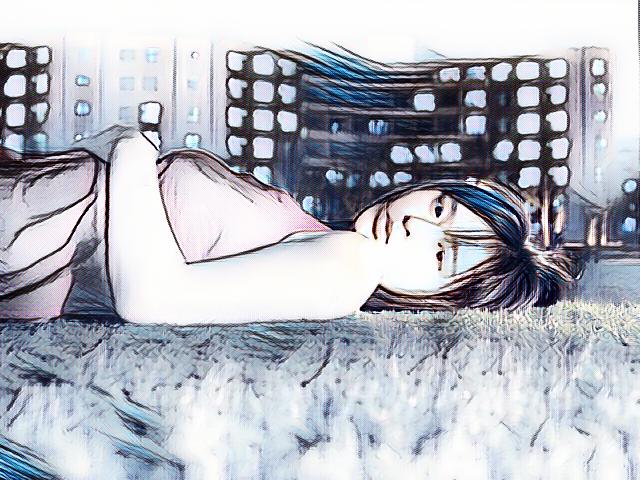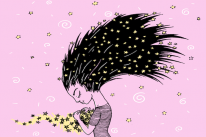“Don’t wait for your feelings to change to take the action. Take the action and your feelings will change.” ~Barbara Baron
As a child, anxious thoughts stopped me from doing a lot of stuff, so I missed out on sleepovers, parties, and scout camps some of the time.
Anxiety whispered in my ear that it was always better to avoid, and so it became easy to convince myself I didn’t really want to do whatever was on offer. I now recognize those thoughts and don’t let them influence my choices.
I remember as a teenager I went to a carvery with my friends, and when I queued up for my food I didn’t see the roasted potatoes. When I sat down I saw all my friends had roasted potatoes, and they were surprised I had none.
The restaurant was full, and I felt too anxious to queue up again because I thought that people would look at me, which sounds crazy to me now, but I remember it very clearly.
In reality, no one would have cared or even noticed had I got up and got some potatoes! My anxious thoughts forced me to go without.
Making decisions has always made me feel anxious, as I constantly worried about what other people would think, and always allowed my anxiety about doing stuff to influence my decisions.
Anxiety for me brings up feelings of helplessness, dread, and resistance. Helpless, as my anxious thoughts lead me to avoid what I want to do. Dread, as anxiety often makes things seem a lot worse than they really are. Anxiety has led me to resist many things I wanted to do and also to do many things I didn’t want to do.
Dealing with Anxiety
When I was eighteen I had the lead role in a play in a local theatre. I had never performed in front of many people before, so this was a huge deal for me. To my surprise, when the first night came I was not anxious but really excited and happy.
This was a major turning point for me, and I realized it was because we had rehearsed and practiced so much that I was totally convinced it was going to be a success.
At university, presentations made me feel highly anxious. People would often comment that as I had done some acting, presentations should be easy for me. That definitely wasn’t true.
Public speaking is a very common fear and is something that I tried to avoid at all costs. After I finished university I did a master’s degree, and it was around this time I started to get interested in personal development. My book collection grew as I discovered the vast number of books that could help you with issues like anxiety.
I began to realize that, even though I often had anxious thoughts, they didn’t have to control my choices and behavior.
Now when I have anxious thoughts they often make me laugh, because I recognize them for what they are: just random thoughts from a part of my brain that never wants to do anything challenging or move out of my comfort zone.
In the past, I was always worried about the future and never really focused on the present moment. Being mindful of what’s going on right now, and recognizing that thoughts are natural occurrences that you can choose to focus on or not, has really helped me to let go of my anxious thoughts and negative predictions about the future.
As I studied personal development, I learned that you can change your mental state through your physiology, your body language, breathing, and speech.
Making sure I stand up straight, control my breathing, speak clearly, and say positive phrases with real intensity changes my state. I do this when I am mindful that I have become worked up by some situation, and the anxiety of it is starting to affect me.
Being aware of my thoughts and feelings, being mindful, and living in the present moment helps me live with my anxious thoughts. Changing my state has enabled me to get back to that feeling I had before going on stage, prior to activities which would have made me feel anxious in the past.
After I finished my Master’s degree, I was astonished when my tutor invited me back to do some lecturing on the course I had just completed. I realized how far I had progressed in terms of dealing with anxious thoughts. And even though I immediately experienced some anxiety, I was able to realize that this was a wonderful opportunity for me, and that I would accept.
During the following months, there were many times when I thought about the lectures and began to feel anxious. Each time I focused on how grateful I was to have the opportunity and what an amazing learning experience it would be. When I accepted that it would be a wonderful experience whether it went according to plan or not, I felt even more enthusiastic about it.
“Ever tried. Ever failed. No matter. Try again. Fail again. Fail better.” ~Samuel Beckett
It seems to me that, like many others, much of my anxiety is born out of a fear of failing and being judged by other people.
Since I started studying self-development and reading about people like Honda and Edison who failed over and over again, and attributed those failures to their success, I have become less afraid of failing. Failure is an important step toward being successful and the best way to learn valuable lessons.
Another of the most important outcomes of coping with anxious thoughts has been that the more often I deal with them, the less afraid of them I become and the fewer I experience.
That doesn’t mean I still don’t experience anxious thoughts from time to time, but if anxiety starts to build up, I address the cause of it straight away and do something positive to help the situation rather than avoiding. For example, before my first lecture I joined Toastmasters and made some speeches there, which helped prepare me and gave me confidence in my own ability.
The most important lesson I’ve learned is that it is possible to experience anxiety without letting it play a major role in our lives. We can have anxious thoughts without letting anxiety control us.
Photo by lian xiaoxiao
About Rhydian Fairfax
Rhydian Fairfax is a young Life Coach and founder of the personal development company Thought Support. He lives and works in Cardiff, UK, and is passionate about helping others to lead a meaningful life.














 Though I run this site, it is not mine. It's ours. It's not about me. It's about us. Your stories and your wisdom are just as meaningful as mine.
Though I run this site, it is not mine. It's ours. It's not about me. It's about us. Your stories and your wisdom are just as meaningful as mine.